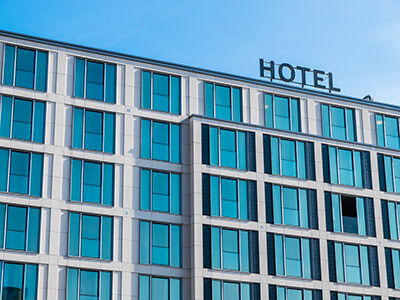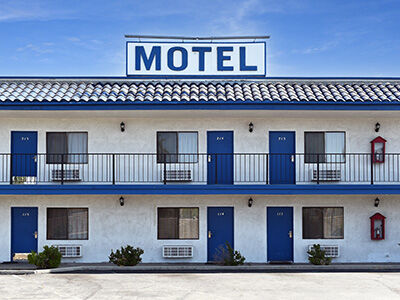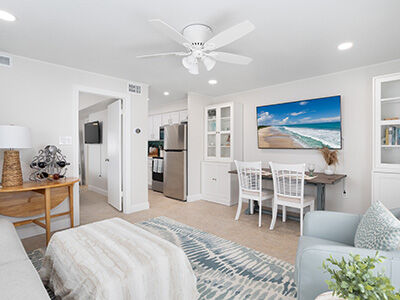Lodging Options...What's The Difference?
Travel

Audio By Carbonatix
When planning a trip, choosing the right accommodation is crucial for a memorable experience. Each type of lodging—hotels, motels, Airbnbs, and resorts—offers unique benefits and drawbacks. Let's delve into the pros and cons of each to help you make an informed decision.

Hotels
Definition
Hotels are commercial establishments providing lodging, meals, and other services to guests. They range from budget-friendly to luxury options and are typically found in urban, suburban, and rural areas.
Pros
- Amenities: Hotels often offer a wide range of amenities such as room service, housekeeping, gyms, pools, spas, and on-site restaurants.
- Security: Enhanced security measures, including 24-hour front desks, surveillance cameras, and secure access to rooms, ensure guest safety.
- Convenience: Located in central areas, hotels provide easy access to tourist attractions, business centers, and transportation hubs.
- Consistency: Chain hotels offer a predictable experience with standardized services and cleanliness.
Cons
- Cost: Hotels can be expensive, especially in prime locations and during peak seasons.
- Personalization: Limited opportunity for personalization compared to more flexible lodging options like Airbnbs.
- Space: Hotel rooms might feel cramped, particularly for families or longer stays.
- Noise: Potential for noise from other guests or street traffic in busy areas.

Motels
Definition
Motels are budget-friendly lodgings designed for motorists, typically located along highways. They offer basic accommodations with direct access to parking areas.
Pros
- Affordability: Motels are generally cheaper than hotels, making them ideal for budget-conscious travelers.
- Convenience: Easy access for road travelers, with parking spaces usually right outside the rooms.
- Simplicity: Basic amenities and straightforward services cater to short-term stays and travelers on the go.
- Pet-Friendly: Many motels are more lenient with pet policies compared to hotels.
Cons
- Limited Amenities: Fewer amenities and services compared to hotels, such as no room service or on-site restaurants.
- Security: Often less secure, with external room entrances and limited staff presence.
- Maintenance: Motels may lack the upkeep and cleanliness standards of hotels.
- Location: Typically located on highways or less scenic areas, which might not be ideal for sightseeing.

Airbnb / Vacation Rental
Definition
Airbnb or VRBO are online platforms allowing people to rent out their homes, apartments, or unique accommodations to travelers. This option offers a wide variety of lodging options worldwide.
Pros
- Variety: Wide range of options, from single rooms to entire homes, catering to different needs and budgets.
- Local Experience: Opportunity to live like a local, often in residential neighborhoods, providing a more authentic experience.
- Personalization: Flexibility to choose properties with specific amenities and features that suit your preferences.
- Space: Typically more spacious than hotel rooms, ideal for families or longer stays.
Cons
- Consistency: Quality and cleanliness can vary significantly between properties.
- Service: Limited or no on-site services like housekeeping or room service.
- Booking Fees: Additional fees and potential hidden costs can make some Airbnbs more expensive than initially expected.
- Regulations: Some cities have strict regulations on short-term rentals, potentially affecting availability and legality.

Resorts
Definition
Resorts are vacation destinations that provide extensive recreational facilities and amenities. They are often located in scenic areas such as beaches, mountains, or lakes.
Pros
- All-Inclusive: Many resorts offer all-inclusive packages covering accommodations, meals, drinks, and activities, simplifying planning.
- Amenities: Extensive amenities, including pools, spas, golf courses, entertainment, and various recreational activities.
- Convenience: Everything you need is on-site, reducing the need to leave the property for dining or entertainment.
- Luxury: High-end resorts provide luxurious accommodations and top-notch service.
Cons
- Cost: Resorts can be expensive, especially all-inclusive options and those in popular destinations.
- Isolation: Often located in remote areas, making it difficult to explore nearby attractions without additional transportation.
- Crowds: Popular resorts can be crowded, especially during peak seasons, affecting the quality of experience.
- Package Limitations: All-inclusive packages might limit dining options and activities to those available on the property, reducing flexibility.
Conclusion
Choosing the right accommodation depends on your travel preferences, budget, and the nature of your trip. Hotels offer convenience and amenities, motels provide affordability for road travelers, Airbnbs deliver a personalized and local experience, and resorts promise an all-inclusive luxury retreat. Consider these pros and cons to find the perfect place to rest your head and make your trip unforgettable. Happy travels!









